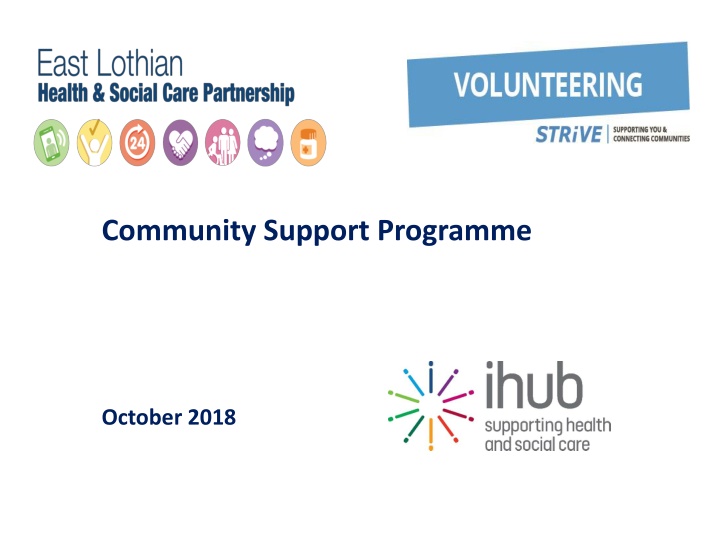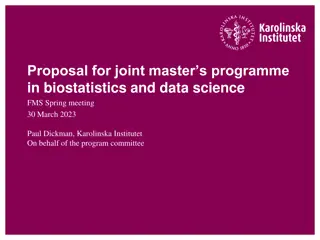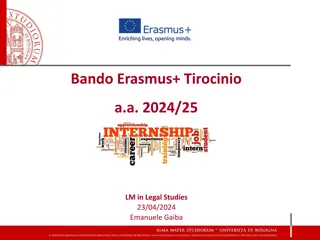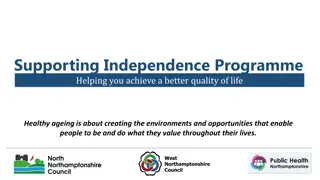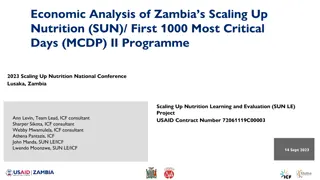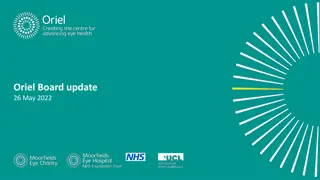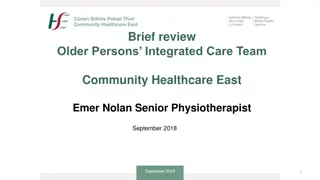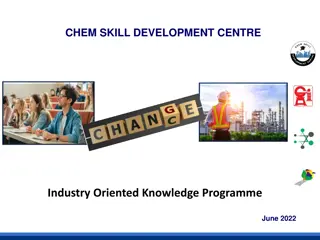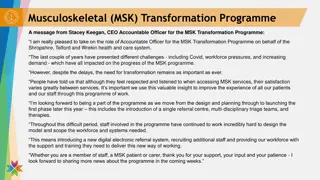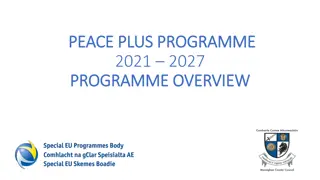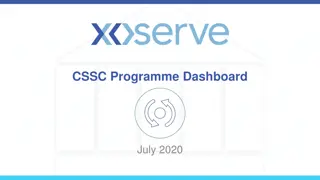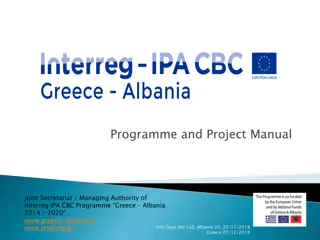Community Support Programme October 2018
"Thank You for Volunteering! Join a movement of change within our community, offering lower-level support to help people live a normal life. Your role involves person-centered support, teamwork, confidentiality, and contributing to activities in a safe manner. Understand the nature of Wellbeing Support as a formal, planned, and coordinated relationship with monitored meetings. Contribute to making a difference in individuals' lives and fostering a sense of belonging."
Download Presentation

Please find below an Image/Link to download the presentation.
The content on the website is provided AS IS for your information and personal use only. It may not be sold, licensed, or shared on other websites without obtaining consent from the author.If you encounter any issues during the download, it is possible that the publisher has removed the file from their server.
You are allowed to download the files provided on this website for personal or commercial use, subject to the condition that they are used lawfully. All files are the property of their respective owners.
The content on the website is provided AS IS for your information and personal use only. It may not be sold, licensed, or shared on other websites without obtaining consent from the author.
E N D
Presentation Transcript
Community Support Programme October 2018
Thank You for Volunteering Thank you for agreeing to be part of a movement of change within our community. This project is NOT about providing care in the sense of washing someone or getting them dressed it s about the lower level help people need to live a normal life. For me it is about us as a community finding the strength and compassion to help one another. It is a simple idea, why should someone who is medically fit to be at home be stuck in hospital because there isn t someone to make sure that they are safe, or to check that they are eating or have food in the house, or to make sure that they are doing the stretching exercises that help them build their confidence and their independence. Or supporting a husband or wife to make sure that there is someone on hand to take a bit of the pressure when times get tough. The difference you can make for a person or their family between them staying in hospital or getting home is enormous but for me the main difference you will make is the sense of belonging they have or that somewhere, someone cares enough to want to help them stay at home. Maureen
Your Role will have a volunteering description. This tells you what your main duties and responsibilities are and who you report to.
It will be impossible for a Volunteering description to list every task you will do but it should largely reflect your role. The kind of duties that might be in your Volunteering description are: Providing support volunteering in a person centred way, communicating well, building relationships and promoting equality and diversity Volunteering as part of a team being a supportive team member and developing your skills to improve your volunteering relationships Contributing to activities in a safe way, keeping clear record, keeping to regulations, following agreed ways of volunteering Respecting Confidentiality by not discussing any personal information on individuals or staff with unauthorised people
Definition and nature of Wellbeing Support A formal, planned and co-ordinated, relationship between a trained volunteer and someone who wishes to be supported. A relationship that is supported and monitored by STRiVE A relationship where the volunteer is reliable and where meetings are pre-arranged.
Boundaries It helps to be sure of the limits and boundaries of your volunteering role. Please do NOT Give your client your home phone number Accept money from or lend money to your client Give or accept gifts Take your client to your home Focus on your own personal problems with your client
Please do Try to arrive punctually at the agreed time Inform a member of the Project Team if you are worried about your client Try to avoid discussing controversial subjects (like abortion, racial issues or homosexuality. Let the client know if you have to change visiting arrangements. If you are unable to get a reply at the door at your pre-arranged visiting time:- Inform a member of the Strive Team
Confidentiality Policy The Community Support Project will operate in accordance with Strive confidentiality policy. In addition, Strive aims to maintain the confidentiality of clients, volunteers and their families by adopting the following procedures: Only information about the client, which is directly relevant to the relationship, will be given to the volunteer Volunteers will not divulge any personal information about the client to a third party. Volunteers will only discuss details of their client in the context of reviews within the boundaries of the project and with the Strive Community Support Project staff. All information regarding a client will be confidential to the project unless this information indicates that the client will be in danger e.g. has threatened to harm self or others. The volunteer will not give details of his/her address or telephone number to the client or family.
Exceptional Circumstances There may be occasions when exceptional circumstances prevail; for example when the person or a third party are at risk or in immediate danger. There is no prescriptive list to cover all occasions, but examples could be: Where the people concerned are clearly putting themselves at risk e.g. involved in an accident, suffering from a drug overdose. Where the emotional or mental state of the person concerned is such that it puts their own or third parties levels of safety at risk. Where a third party is at risk of danger or abuse, e.g. where a sibling is left within a family and is being abused. Where the issue raised comes within the guidelines of Strive own volunteer policy, i.e. situations of abuse affecting young people under 16 years of age.
Data Protection Policy All Community Support Project records are kept on computer and registered under the Data Protection Act through Strive. All written records will be kept in locked cabinets. Project staff will avoid taking home documents which could identify clients or volunteers Only information that is relevant to the Service s work will be kept. Clients and volunteers are entitled to have access to the contents of any records held about them which have been originated by Strive. The full version of this Policy is available on our website or printed version by request.
Support for You & Ongoing contact Introduction to client after satisfactory completion of training Ongoing contact with staff Reviews & endings References Recognition Events for volunteers Regular social meetings will be arranged for volunteers to provide them with chances to meet with staff members and other volunteers. Training courses that may be of interest to our volunteers i.e. First Aid, Dementia Awareness, Epilepsy will be available. Volunteers may contact the Project team any time they have a problem or issue and arrange a meeting.
References The Project Team are happy to provide a reference for employment or educational purposes after a minimum of three months volunteering with us. Expenses Strive has a budget and will reimburse reasonable expenses incurred by volunteers (e.g. mileage, bus fares, coffee, cinema ticket etc). Please provide receipts along with your signed expense form. Most places will give you a receipt. If they don t, ask for one if a till is not available, they should write a receipt on paper. Completed forms should be sent to the office at the end of each month. The upper limit of volunteer expenses that Strive can reimburse per month is 40. 00. Clients are expected to meet their own costs. Any volunteers in receipt of benefit are recommended to inform the Benefits Agency that they are doing voluntary work and claiming expenses. Volunteer Agreement Each volunteer is required to sign a Volunteer Agreement before they are matched with a person or group. This agreement details what the Community Support Project expects from its volunteers.
Endings If a review establishes that the agreement is no longer meeting the client or volunteers needs, the arrangement will be ended in a sensitive way. Where possible the ending of the volunteering should be planned in advance and discussed during review meetings. Insurance All volunteers are insured to the statutory minimum through Strive insurance whilst they are out with a client in a volunteer capacity. This cover includes: Personal accident this protects staff and volunteers against any accident or injury occurring through negligence of Strive. Public liability this is a third party insurance and provides cover for death, injury, loss and damage of property of anyone coming into contact with Strive e.g. volunteers who are working in the community or in someone s home. This also protects you against a claim from a client if you were to damage something in their home or cause an accident to the client.
Guidelines for car users If you intend to use your car, you must inform your insurance company that you are using your car for voluntary work. Most companies are happy to add this to your policy at no extra cost. Strive cannot accept liability for any damage to your car incurred while you are volunteering. You will be asked to sign a driver declaration form stating that you will be informing your insurance company. Please Note: Failure to do this may invalidate your policy and make you liable for damages.
Complaints Procedure Everyone who comes into contact with Strive has the right to be treated fairly and with respect. Any initial complaint or grievance should be directed to the Project Worker. If the issue is unresolved or the complaint is about the Project Worker then the complaint should be directed to the CEO or Deputy CEO, Strive and following the complaints procedure outlined on our website or by requesting a printed copy.
Equal and Diversity Policy Strive recognises that everyone has a contribution to make to our society and the right to equal treatment. Strive is committed to achieving equality of opportunity in its activities and ensuring that employment, volunteering and services are truly open to all members of the community. It is our policy that everyone who comes into contact with STRiVE shall be treated equally and with respect regardless of: Gender, gender reassignment or sexual orientation Disability (physical, mental or learning disabilities and other limitations which may not fall into the legal definition of disability, for example being frail) Race, colour, ethnic or national origin Religion or belief (any religion, religious belief or philosophical belief) Marital, social, economic status or responsibility for dependants Age Political beliefs Trade union membership Unrelated criminal convictions Strive is strongly opposed to any form of discrimination and seeks to ensure that its own policies and practices are non-discriminatory. The full version of this Equality and Diversity Policy is available on our website or by requesting a printed copy.
Health & Safety Policy It is the policy of STRiVE to accord the greatest importance to the safety of its employees and volunteers, considering it to be a management responsibility equal to that of any other function. The statutory requirements are regarded as the minimum acceptable and management will seek to improve on these whenever possible. It is the duty of every member of staff and volunteers to exercise responsibility, and to do everything possible to prevent injury and ill health to her/him and others. To this end, Management undertake to provide the necessary training in Health & Safety matters, and to provide such precautions as are deemed necessary by risk assessment. The full version of this policy is available on our website or by requesting a printed copy.
Policy on Protecting Vulnerable Groups Strive aims to ensure that any vulnerable group, whether young people or vulnerable adults are protected and kept safe from harm while they are with staff and volunteers in this organisation. In order to achieve this we will ensure our staff and volunteers are carefully selected, screened, trained and supervised. All Volunteers will be asked to register with The PVG Disclosure Scheme prior to the start of volunteering. A scheme record update will be required for existing PVG Scheme members. The full version of this policy is available on our website or by requesting a printed copy.
Policy on the Recruitment of Ex-Offenders Strive and The Community Support Project undertakes to treat all volunteers fairly and not to discriminate against the subject of a disclosure on the basis of conviction or other information revealed. Anyone undertaking regulated work will be required to become a member of the PVG Scheme or if already a scheme member, a Scheme Record Update will be required. Where a position requires PVG Scheme Membership we will make this clear on the application form, job advert and any other information provided about the post. Having a Criminal Conviction/Disclosure will not necessarily prohibit you from Volunteering with us. All Disclosures are risk assessed and managed on an individual case by case basis. The full version of this policy is available on our website or by requesting a printed copy.
Risk Assessment Referral agencies are made aware that volunteers will sometimes be meeting up with clients on their own at the clients home. The Project team establishes from the referrer information about others who share the house with the potential client and any known risk from these parties. If a substantial degree of risk is apparent from either the potential client or his/ her family, then the referral will not be accepted and will not proceed.
Lone Working & Guidelines on Personal Safety At all times be aware of your surroundings and potential exit routes. Trust your intuition: if you feel scared or uneasy, do not ignore the warning. Remove yourself from the potential danger as soon as possible. Do not enter the house or go out with your client if he/she appears to be under the influence of alcohol or drugs. Where possible let someone know where you are going and when you expect to be back. Inform the person you are meeting of your expected time of arrival. Volunteers are advised not to give home details or telephone numbers to clients or their relatives. Carry minimum personal belongings when on befriending meetings. Carry mobile phone, phone card or change for emergency phone call. Have car keys or house keys easily accessible in hand or pocket. If you are using your own transport, plan your route in advance and have some directions in the car. When parking in daylight, consider what the area will be like after dark. At night, park in an area which is well lit and if possible, busy. In case of a breakdown have a plan to follow. If travelling by public transport, try to obtain a timetable in advance of your journey. If you are travelling by bus, sit downstairs. If you are on foot, do not take shortcuts unless you know they are safe. If you think you are being followed, cross the road and keep walking. If you are still being followed, make for the nearest busy area. Strive can supply you with a personal alarm to carry with you when carrying out your volunteering. Lone Working Policy -The full version of this policy is available on our website or by requesting a printed copy.
